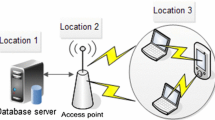Abstract
In a wireless environment, mobile clients often cache frequently accessed data to reduce contention on the limited wireless bandwidth. However, it is difficult for clients to ascertain the validity of their cache content because of their frequent disconnection. One promising cache invalidation approach is the Bit-Sequences scheme that organizes invalidation reports as a set of binary bit sequences with an associated set of timestamps. The report is periodically broadcast by the server to clients listening to the communication channel. While the approach has been shown to be effective, it is not energy efficient as clients are expected to examine the entire invalidation report. In this paper, we reexamine the Bit-Sequences method and study different organizations of the invalidation report to facilitate clients to selectively tune to the portion of the report that are of interest to them. This allows the clients to minimize the power consumption when invalidating their cache content. We conducted extensive studies based on a simulation model. Our study shows that, compared to the Bit-Sequences approach, the proposed schemes are not only equally effective in salvaging the cache content but are more efficient in energy utilization.
Similar content being viewed by others
References
D. Barbara and T. Imielinski, Sleepers and workaholics: Caching in mobile distributed environments, in: Proceedings of the 1994 ACMSIGMOD International Conference on Management of Data (June 1994) pp. 1–12.
J. Cai and K.L. Tan, Energy efficient selective cache invalidation, Wireless Networks 5(6) (1999) 489–502.
J. Flinn and M. Satyanarayanan, Powerscope: A tool for profiling the energy usage of mobile applications, in: Proceedings of the Second IEEE Workshop on Mobile Computing Systems and Applications (February 1999).
G.H. Forman and J. Zahorjan, The challenges of mobile computing, IEEE Computer 27(6) (April 1994).
J. Jing, A. Elmagarmid, A. Helal and R. Alonso, Bit-sequences: An adaptive cache invalidation method in mobile client/server environments, Mobile Networks and Applications 2(2) (1997) 115–127.
J.R. Lorch and A.J. Smith, Software strategies for portable computer energy management, IEEE Personal Communications 5(3) (June 1998).
K. Watkins, Discrete Event Simulation in C (McGraw-Hill, 1993).
K.L. Wu, P.S. Yu and M.S. Chen, Energy-efficient caching for wireless mobile computing, in: Proceedings of the 12th International Conference on Data Engineering (February 1996) pp. 336–343.
Author information
Authors and Affiliations
Rights and permissions
About this article
Cite this article
Tan, KL. Organization of Invalidation Reports for Energy-Efficient Cache Invalidation in Mobile Environments. Mobile Networks and Applications 6, 279–290 (2001). https://doi.org/10.1023/A:1011435018072
Issue Date:
DOI: https://doi.org/10.1023/A:1011435018072




